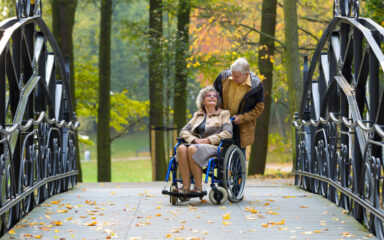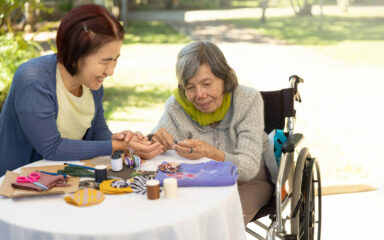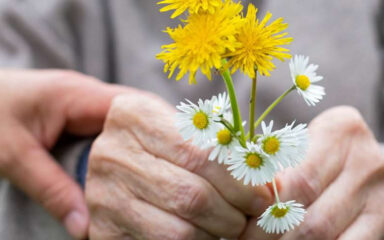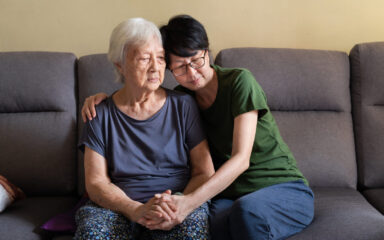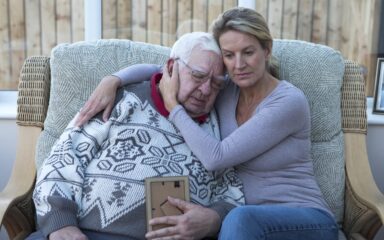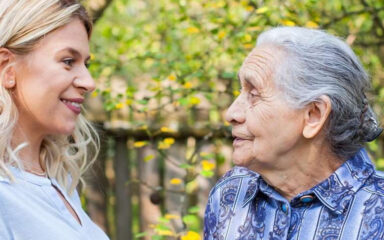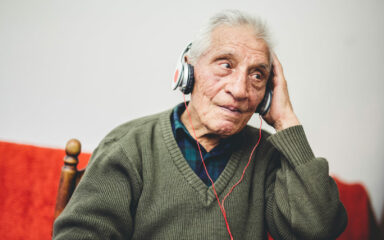Go Purple To End Alzheimer’s Disease
Explore key strategies for managing Alzheimer’s and support your loved one. Go purple to raise awareness and take action against Alzheimer’s disease.
Find local care advisors
What is
Alzheimer’s?
Alzheimer’s disease is far more than just memory loss—it’s a condition that can significantly impact the daily life of seniors.
This progressive brain disorder slowly erodes the ability to remember, think clearly, and manage everyday tasks, making it increasingly difficult to maintain independence. Go Purple to raise awareness and support those affected.
In Alzheimer’s, the brain undergoes profound changes, including the buildup of abnormal proteins like amyloid plaques and tau tangles. These harmful proteins disrupt the normal function of neurons, leading to the gradual loss of connections between nerve cells. Over time, this damage causes brain cells to die, affecting cognitive functions and daily living. For a deeper understanding of how Alzheimer’s impacts the brain, you can refer to the NIH Alzheimer’s Disease Fact Sheet.

Types of
Alzheimer’s
Alzheimer’s disease can affect each senior differently. Knowing the types and stages of the disease can help you understand what to expect and how to prepare. Go Purple to learn more and take action.
Types of Alzheimer’s
-
Early-Onset Alzheimer’s:
This form affects people under 65, sometimes even in their 40s or 50s. It’s often linked to genetics but progresses much like the common form of the disease.
-
Late-Onset Alzheimer’s:
This is the most common type, usually affecting people after age 65. It starts with mild memory issues and slowly worsens over time.
-
Familial Alzheimer’s Disease (FAD):
This very rare type is inherited and often leads to early symptoms. If Alzheimer’s runs in your family, this may be why. More information can be found in the Alzheimer’s Disease Journal.
Stages of Alzheimer’s
-
Mild (Early Stage):
You might notice slight memory lapses or have trouble planning. You can still manage most activities but may need occasional help.
-
Moderate (Middle Stage):
Memory and language issues become more noticeable. You might need more help with daily tasks and experience changes in mood or confusion.
-
Severe (Late Stage):
This stage significantly impacts daily life. You may need full-time care as it becomes harder to communicate, recognize loved ones, or take care of yourself.
Care Plan
Options
When it comes to managing Alzheimer’s disease, finding the right care plan is essential. There are several care options available, each designed to meet different needs as the disease progresses. Go Purple to explore the best care options for your loved one.

-
In-Home Care:
Keeping your loved one in the comfort of their home can be reassuring. In-home caregivers provide help with daily tasks, medication management, and companionship, allowing them to stay in a familiar environment while receiving the support they need.
-
Adult Day Care:
Adult day care centers offer a safe and social environment during the day, where your loved one can engage in activities, enjoy meals, and receive specialized care. This option also gives you, as the caregiver, a much-needed break to recharge.
-
Assisted Living:
Assisted living communities provide a balance between independence and support. They offer help with daily tasks, meals, and medical care, along with memory care services tailored to those with Alzheimer’s. This option allows your loved one to maintain some independence while receiving the care they require.
-
Memory Care Communities:
Specifically designed for individuals with Alzheimer’s, memory care communities offer a secure environment with specialized care and activities. These communities are staffed with professionals trained to handle the unique challenges of Alzheimer’s, ensuring your loved one receives the best possible care.
-
Nursing Homes:
For loved ones needing more intensive care, nursing homes provide 24/7 supervision, medical support, and assistance with all daily activities. This option is ideal when your loved one requires constant care and monitoring, ensuring their safety and well-being at all times.

Take Our Senior Care Needs Assessment for Personalized Recommendations
Wondering if it’s time to consider senior living options for your loved one? Our free Senior Care Needs Assessment Tool can help. This easy-to-use tool provides a personalized recommendation based on your loved one’s specific needs and safety concerns. Whether you’re exploring in-home care, assisted living, or other options, our tool will give you the insights you need to make an informed decision.
Find the Perfect
Senior Living Options and Services
With their personalized guidance, you’ll quickly find the ideal community where your loved one will feel safe, supported, and truly at home.
Finding the right senior living option and services can be challenging, but our trusted franchise partners are here to make it easier. These experts know your local area and can guide you in choosing the best community, whether it’s independent living, assisted living, or memory care.











Blog Posts
Common Questions and Answers

Early signs of Alzheimer’s may include forgetting recent events, struggling to find the right words, feeling confused about time or place, and having trouble with familiar tasks. You might also notice misplacing things more often, mood changes, or withdrawing from social activities.
Care options for seniors with Alzheimer’s include in-home care, adult day care, assisted living, memory care communities, and nursing homes. Each option provides varying levels of support, from assistance with daily tasks to specialized memory care.
Lifestyle changes that may reduce the risk of Alzheimer’s include regular physical exercise, a healthy diet rich in fruits, vegetables, and whole grains, mental stimulation, social engagement, and maintaining good cardiovascular health. Managing stress and getting quality sleep are also important.
Supporting a loved one with Alzheimer’s involves being patient, maintaining open communication, and creating a safe environment. It’s essential to establish routines, encourage social interaction, and provide emotional support. Joining support groups and seeking help from professionals can also be beneficial.
Preparing your home for a loved one with Alzheimer’s involves making safety modifications, such as removing tripping hazards, installing locks on doors and cabinets, and ensuring good lighting. It’s also helpful to create a calm, familiar environment and label items to reduce confusion. Consider setting up a structured routine to provide comfort and predictability.

